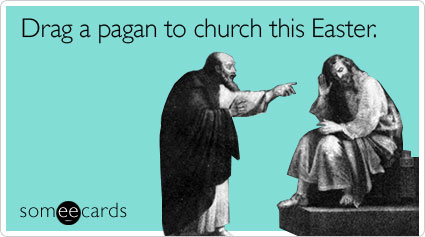In the wake of our beloved Mrs. B facing "religion-gate" [between her daughter and a particularly rude music teacher], let us all share a light chuckle over an insatiable irony -- the origins of Christianity's "Easter". To fully appreciate the aforementioned irony it is necessary to know that this heinous educator proclaimed to Mrs. B's daughter...
"Pagan Holy Days are an oxymoron."
I know, right! Now, pick up your jaws and let's carry on.
Because the truth of the matter is, their Easter, as celebrated across the globe today, and most especially here in the United States, is undoubtedly linked to a Pagan past. One needn't strain to see the similarities between the Pagan celebration of Ostara [rooted in preChristian festivals honoring Spring, fertility and new life on earth] and the Christian customs of Easter [honoring the resurrection and "new life" of the Savior].
The name alone has been factually linked [World Book Encylopedia, (article, "Easter," vol. 6, p. 25)] to "Eostre, a Teutonic goddess of spring, or from the Teutonic festival of spring called Eostur". Eostre [Eostur/Eastur/Ostara/Ostar] was coined by the Norsemen to mean the birth of a new season and this name is given to the Anglo-Saxton Goddess of Spring and Fertility. Considering the age of these cultures and their related words, celebrations involving such "Feasts of New Life" predate not only the Christian faith but the very birth of the Messiah.
Is there even such thing as a double-oxymoron?! Because if you follow the customs of a religious holiday that date back to Pagan origins which you then claim to be of themselves an oxymoron, doesn't that make your celebration of Easter a double-oxymoron? Yikes, my brain hurts!
 |
| Another double-oxymoron courtesy of someecards.com |
Please remember before belittling the beliefs of another that no Faith is without its controversy. You have no more right to claim your holy days than I do mine. Even your own holy book refers you to the Church-sanctioned holidays that you should be celebrating -- oh, and heads up... Easter is not one of them. Nor Christmas.
According to David C. Pack, [author of "God's Holy Days or Pagan Holidays"]: "The Bible does, in fact, mention Christmas and Easter—and certain other familiar holidays—but it bluntly condemns them as heathen customs. The proof is overwhelming that these days are “traditions” and “commandments of men.” But vast multitudes keep them anyway, seemingly content to worship Christ in vain!"
Even your own Jesus Christ is quoted to have said: “In vain do they worship Me, teaching for doctrines the commandments of men…full well you reject the commandment of God, that you may keep your own tradition” [Mark 7:7 9].
So until you're willing to give up these highly-celebrated "holy" days, I suggest you bite your tongue when it comes to the traditions of others. Shame on you for that alone and shame on you additionally for defiling your position as educator by demeaning the values of someone who once looked to you with respect. Bravo for showing this impressionable young mind how very ugly the world can on occasion be.
Want to be such a snooty-puss? Fine -- give us back our Easter Eggs, Easter Bunny, Easter Parade and Hot Crossed Buns!! Oh, did you think they were your traditions? Not quite. I feel and sound very catty in stating that. Normally I do strive to remain very tolerant of others. After all -- how might we expect to receive acceptance if we can't offer it in return. I guess when an individual is willing to attack the beliefs of a child however, my naughty kitty comes out to play. [I just might have to get her declawed because if anything similar ever happens to my children, I'll probably swipe first and hiss later!]
I leave you now with the following, a relevant excerpt from the Hope of Israel site:
I leave you now with the following, a relevant excerpt from the Hope of Israel site:
You may be surprised to learn that red, blue, yellow or green eggs, as symbols of the renewal of life, were part of a custom that goes back centuries before the birth of the Messiah. Eggs, a symbol of fertility in many lands, are easily traceable to ancient pagan lore. So is the famous Easter bunny. (Only the chocolate rabbit is modern.) This rapidly breeding and multiplying animal was an ancient symbol of fecundity. And so modern children, eagerly hunting for Eastern eggs supposedly deposited by a rabbit, are unknowingly following an ancient fertility rite.
What about the Easter parade? Does that, too, date back to the days of antiquity when pagans paraded in the springtime, donning new hats and clothes to honor their goddess of spring?
The answer is yes. Scholars can trace the Easter parade to similar rites in ancient Germany, Greece, and even India.
Hot-cross buns, interestingly enough, were eaten by pagan Saxons in honor of Easter, their goddess of light. The Mexicans and Peruvians had a similar custom. In fact, the custom of eating hot-cross buns was practically universal in the ancient pagan world!
Easter fires, although not a widespread phenomenon today, are still lit in some northern European countries, notably Germany. This practice is clearly traceable to pagan antiquity.
And what about Easter sunrise services? They too go back to the pagan custom of prostrating before the rising springtime sun. The goddess of light, Eastre or Ostera, was identified with the rising sun.
Plainly, then, today's Easter has its roots deep in ancient paganism -- centuries before the birth of the Messiah -- and its rites have scarcely changed.